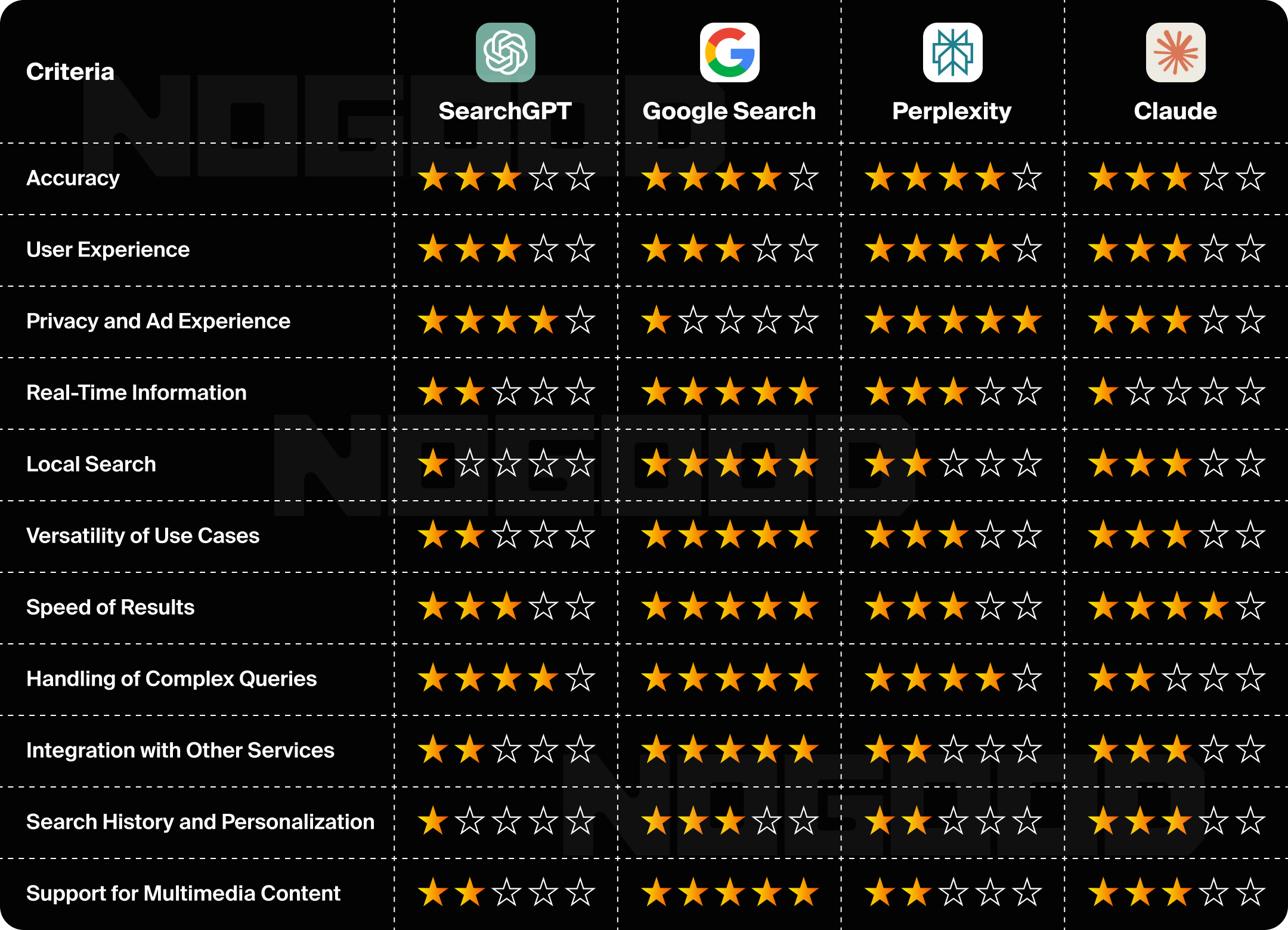I recently installed the SearchGPT Chrome extension, but I ended up removing it just a few hours later. Here’s why I found it lacking as a default search engine compared to Google and emerging alternatives like Perplexity.
Local Search
One of the biggest issues with SearchGPT is its local search capabilities. For example, when I searched for “growth marketing agencies,” I was surprised to see “Juice Generation,” a local juice store, show up as the second result—definitely a new level of hallucination unlocked!
Local search is crucial for users looking for nearby services or products, and this is an area where Google excels. Google provides detailed results that often include user reviews, business hours, and contact information. The inability of SearchGPT to deliver reliable local search results makes it a less appealing option for those who need immediate, actionable information.
Moreover, when searching for products or services, Google pulls in user reviews and ratings from various platforms, offering a comprehensive overview of customer experiences. SearchGPT does not provide such reviews, making it difficult for users to assess the quality of a product or service.

Intent Recognition and Understanding Synonyms
Another major issue I encountered with SearchGPT was its intent recognition. When I used keywords in my searches, the extension often missed the intent behind my queries. While it can craft personalized responses, it struggles to understand user intent, especially with short phrases.
For instance, if I searched for a word’s meaning, correct pronunciation, or spelling without fully framing my question, ChatGPT would often get confused. In contrast, Google delivers expected answers almost instantly. This expectation has built up over years of using Google, so when an alternative falls short, it can be frustrating.
Additionally, Google has built an impressive ability to recognize synonyms and related terms, enhancing its effectiveness. For example, searching for “automobile” and “car” yields similar results on Google, while SearchGPT may not make that connection as effectively, leading to missed relevant content.
Usage Limits
Once you enable the SearchGPT Chrome extension, it becomes the default search engine in your browser. However, I faced a frustrating limitation: the extension can suddenly stop working and display a daily limit message. This kind of behavior is unacceptable for a default search experience, as it forces users to switch back to alternatives that don’t impose such restrictions.
This limitation disrupts the search process and diminishes the overall user experience. In today’s digital age, where seamless interactions are expected, having to revert to another tool due to usage limits is a significant drawback for SearchGPT.

Missing Search Use Cases
SearchGPT also falls short in offering a variety of search use cases. Features like images, travel, video, news, and shopping are either underdeveloped or completely absent. In a world where users expect to conduct various types of searches effortlessly, this limitation is notable.
Google thrives in this area, allowing users to search for images, track flights, watch videos, and find news articles all in one place. SearchGPT’s lack of these functionalities makes it feel like a limited tool rather than a comprehensive search engine.
Google provides a diverse range of content types, including articles, videos, infographics, and podcasts. For example, if you search for “marketing trends,” Google will return articles, videos, and relevant statistics. SearchGPT may not offer the same variety, limiting the depth of information available.
Grounding and Real-Time Information
When it comes to providing real-time information, Google excels. Whether it’s weather updates, local alerts, or news, Google consistently delivers accurate and timely information. In contrast, SearchGPT struggles to keep up with current events or dynamic data, making it less reliable for urgent inquiries.
This ability to provide real-time information is crucial for users who need accurate, up-to-date data to make informed decisions. Without this capability, SearchGPT risks becoming irrelevant in a fast-paced digital environment.
Additionally, Google often highlights trending searches and popular content. If you search for something like “latest news in AI,” Google shows current trends and hot topics. SearchGPT may lack the ability to reflect real-time popularity or trends in its responses.
The Barrier of Breaking Old Habits
It’s clear that our habits with Google are hard to break without a better alternative. While I hoped SearchGPT would provide a more effective approach to search, my experience fell short. The extension simply doesn’t measure up to our expectations for a default search engine. Perhaps Perplexity just set our expectations of new search engines to a high standard. Making it even more difficult for newer platforms like SearchGPT that just aren’t quite fully ready to be a default search engine.
That said, SearchGPT is a notable addition to the OpenAI family and contributes to the evolving AI search landscape. However, as of now, Perplexity continues to stand out among new answer engines, especially for knowledge searches. Yet, the world of search encompasses much more than just these inquiries. Users need a comprehensive tool that can effectively address a wide range of search needs.
Here is how I would personally rate these search experiences against one another:






